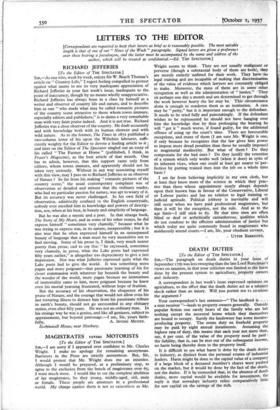LETTERS TO THE EDITOR
[Correspondents are requested to keep their letters as brief as is reasonably possible. The most suitable length is that of one of our " News of the Week " paragraphs. Signed letters are given a preference over those bearing a pseudonym, and the latter must be accompanied by the name and address of the author, which will be treated as confidential.—Ed. THE SPECTATOR.]
RICHARD JEFFERIES
[To the Editor of THE SPECTATOR.] SIR,—As one who, week by week, enjoys Sir W. Beach Thomas's
article on " Country Life," I regret feeling compelled to protest against what seems to me its very inadequate appreciation of Richard Jefferies in your last week's issue, inadequate to the point of inaccuracy, though by no means wholly unappreciative. Richard Jefferies has always been in a class by himself as a writer and observer of country life and nature, and to describe him as one " who made what may be called romantic pictures of the country scene attractive to those whom towns immure, especially editors and publishers," is to damn a very remarkable man with very faint praise indeed. And it is not true. Richard Jefferies was a close observer of the country. He dealt accurately and with knowledge both with its human element and with wild nature. As to the former, The Times in 1872 published a two-column letter of his upon the Wiltshire labourer, suffi- ciently weighty for the Editor to devote a leading article to it ; and later on the Editor of The Spectator singled out an essay of his called " The Farmer at Home " (published, I think, in Fraser's Magazine), as the best article of that month. One has to admit, however, that this support came only from editors, whom towns immure, and apparently should not be taken very seriously. Without in any way associating myself with this view, may I pass on to Richard Jefferies as an observer of Nature ? So far from his making " romantic pictures of the country scene," the usual contemporary complaint was of observation so detailed and minute that the ordinary reader, who had no particular passion for nature, was apt to weary of it. But its accuracy was never challenged. In his own field of observation, admittedly confined to the English countryside, nobody ever excelled him in knowledge and powers of descrip- tion, nor, when at his best, in beauty and simplicity of language.
But he was also a mystic and a poet. In that strange book, The Story of My Heart, and in some of his other essays, he did express himself " sometimes very clumsily," because what he was trying to express was, in its nature, inexpressible ; but it is also true that he often expressed himself in an unsurpassed beauty of language that a man must be very insensitive not to find moving. Some of his prose is, I think, very much nearer poetry than prose, and to say that " he expressed, sometimes very clumsily, in prose, what the Lake poets had expressed fifty years earlier," is altogether too depreciatory to give a just impression. Nor was what Jefferies expressed quite what the Lake poets had to give the world. It was something more pagan and more poignant—that passionate yearning of his for closer communion with whatever lay beneath the beauty and the wonder of the world, more pagan because no intimations of immortality came to him, more poignant because he knew even his mortal yearning frustrated, without hope of fruition.
But the accuracy of his observation, the eloquence of his
praise of Nature, and the courage that would not allow even his last torturing illness to distract him from his passionate tribute to earth's beauty, should not go unrecorded in any obituary notice, even after fifty years. He was not an ordinary man. In his strange way he was a genius, and like all geniuses, subject to appraisement, but beyond patronage.—I am, Sir, yours faith- fully, A. IRVING MUNTZ. Ecchinswell House, near Newbury.






































 Previous page
Previous page